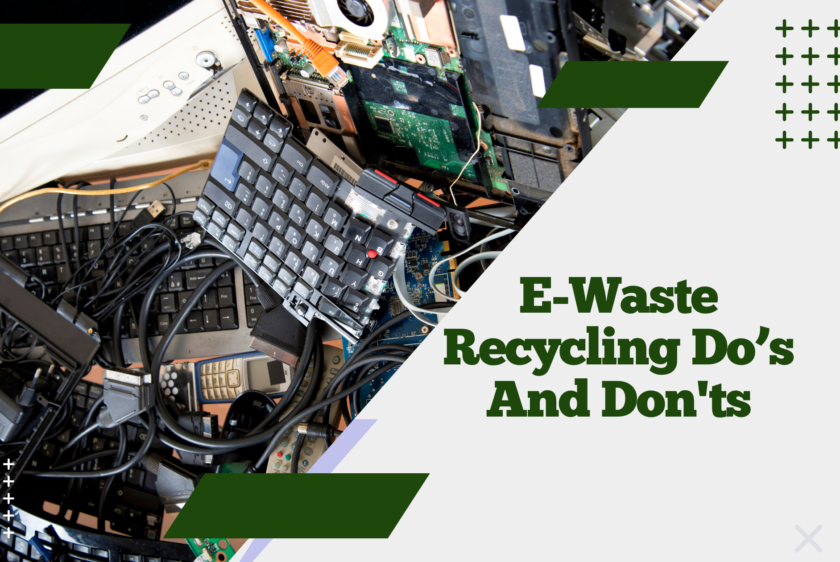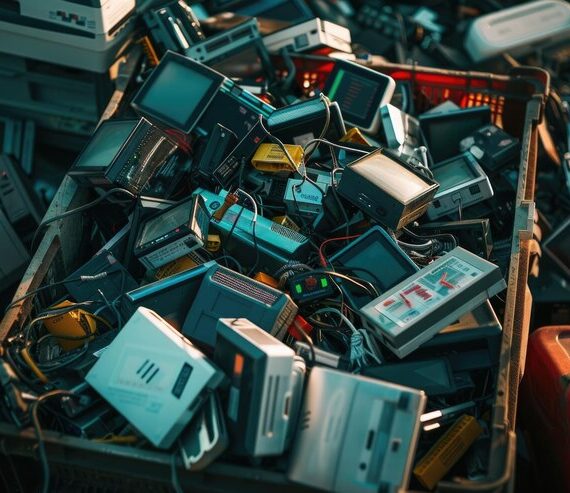
E-waste Recycling Do’s and Don’ts: A Quick Guide
In the modern digital age, electronic devices have become essential tools in our everyday lives. These devices enhance our communication, productivity, and entertainment. However, with this technological progress comes a significant environmental challenge – electronic waste. It contains harmful materials like lead and mercury that can pose a serious threat to the environment and human health. This quick guide explores the do’s and don’ts of e-waste recycling for individuals and businesses. We can promote a cleaner and healthier environment by adopting responsible practices.
Be Mindful Of E-waste Do’s And Don’ts During Recycling
E-waste Do’s and Don’ts for Individuals
Do’s:
Research E-Waste Recycling Facilities: Before disposing of your electronic devices, research and identify reputable e-waste recycling facilities in your area. Look for certifications like E-Stewards or R2 (Responsible Recycling) to ensure ethical and environmentally friendly practices.
Delete Personal Data: Before recycling or donating your electronic gadgets, ensure that all personal data is securely deleted. Use specialized software or perform a factory reset to protect your privacy.
Separate Components: Disassemble devices to separate recyclable materials like metals, plastics, and glass when possible. This facilitates the recycling process and reduces the environmental impact.
Donate or Resell Functional Devices: If your electronic device is still functional, consider donating it to a charitable organization or selling it to extend its lifespan.

Don’ts:
Dumping in Regular Waste: Avoid disposing of electronic devices in regular household waste bins. Electronic waste requires specialized handling and recycling processes to minimize its environmental impact.
Ignoring Local Regulations: Be aware of and adhere to local e-waste disposal regulations. Some areas may have certain guidelines for electronic waste recycling, and compliance is crucial to ensure responsible disposal.
Throwing Batteries in Regular Trash: Batteries are common components of electronic devices and can leak harmful chemicals when disposed of in regular trash. Recycle batteries separately at designated collection points.
E-waste Do’s and Don’ts for Businesses
Do’s:
Implement E-Waste Management Policies: Establish comprehensive e-waste management policies within your organization. Clearly outline procedures for the disposal and recycling of electronic devices used by employees.
Partner with Certified Recyclers: Collaborate with certified electronic waste recycling companies that adhere to industry standards. Establishing partnerships ensures that your business contributes to sustainable and ethical recycling practices.
Educate Employees: Conduct regular training sessions to make employees aware of the importance of responsible e-waste disposal. Encourage them to follow company policies and use designated collection points for electronic devices.
Audit and Track E-Waste: Implement systems to audit and track electronic waste disposal within your organization. Monitoring the lifecycle of electronic devices enables better decision-making and ensures compliance with environmental regulations.
Don’ts:
Disposing of Electronics Indiscriminately: Avoid disposing of electronic devices without clearly understanding their environmental impact. Consider the entire lifecycle of the device and choose responsible disposal methods.
Exporting Electronic Waste Illegally: Do not engage in the illegal export of electronic waste to developing countries. This practice contributes to environmental degradation and poses ethical concerns.
Final Decision!
Responsible e-waste disposal is a collective responsibility that individuals and businesses must embrace to protect the environment and conserve valuable resources. By following the dos and don’ts outlined in this guide, we can contribute to sustainable electronics recycling and make informed choices that prioritize the health of our planet. Let us strive towards a future where electronic waste is managed responsibly, paving the way for a more sustainable and environmentally conscious world.
Read Our More Blogs:
What Are The Different E-Waste Recycling Certifications And Standards?
Benefits Of Choosing Certified E-Waste Recyclers For Your Business
Follow us:







